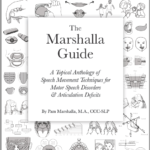Unloading those therapy materials:)
Occasionally I peruse ASHA forums to get ideas. The first one I came across today was a therapist who wanted to get rid of some of her materials. If you have the equivalent of more than 6, 7 or even 8 bins of speech materials this post might be for you. It’s been my personal experience that few therapists ever let go of their materials. Even my retired colleagues were hesitant to let go of materials until they were comfortably into retirement or when tests became outdated, whichever came first. I myself finally purged two years ago. I got rid of anything I hadn’t used in 20 years, anything that I knew never worked in the first place and anything I knew I could easily find on line. In true speech therapist fashion it wasn’t more than a couple grocery bags full of recycling. However, I felt organized.
Why is it so hard for us to give up our materials? The reason is we never know what our caseloads are going to look like from year to year. After 15 years of treating fairly typical learning disabled middle school students, I ended up with 2 significantly delayed children on my caseload. Well, thank goodness I never got rid of my story cards and other materials designed for younger children. I saved the school hundreds and made my job a little easier.
For therapists who are looking to pass on their treasured (or not so treasured) materials a couple of web sites have set up “swaps.”
Speaking of Speech has set up “The Speech Swap Meet” Take a look at the full site while you’re there it looks interesting.
ASHA has also set up a Professional Materials Exchange
Both look like good resources to unload your unwanted materials. Some materials are free and some therapists are trying sell their therapy materials. On both sites it looks like there are more people asking for materials/tests than giving up materials/tests. Then of course there is going to be a shipping fee. I’ve also seen many used books and materials available on Amazon.
Just like anything else people own, we always think our stuff is worth more than it really is. My materials work for me but I have a feeling other therapists would not see the same value I do. There are a lot of programs and books out there that honestly are not worth the paper they’re printed on.
I wonder if school districts that are financially strapped or suffered some type of tragedy might benefit more from a donation. That might be a better use for relevant materials and it’s a tax break.
Does anyone have a resource for donating relevant or current therapy materials to poorer communities or other schools in need?








The length of time for an older teen or an adult to fix one spceeh sound depends completely on the client’s motivation and attitude toward hard work.My last client before I retired was a 16-year-old with a frontal lisp (/s/ problem). At the start, she was totally unable to pronounce the sound even in isolation. At the end of the second week, not only was she saying the sound consistently, she had already carried it over to conversational spceeh. It took only 8 visits because she was so motivated and worked very hard, both in and out of the therapy sessions. You may be able to do the same. Developmental articulation disorders like yours aren’t covered by any insurance company I’ve ever worked with. They only cover post-surgical or other acquired problems, such as a stroke, other neurological disorders (Parkinson’s, etc.), and some ENT diagnoses.Sessions can cost as much as $150/session if in a hospital or clinic setting. I suggest contacting a spceeh pathologist or two and ask if they will see you privately for $50 or $60 per session after work. The standard treatment regimen is twice per week following a complete evaluation.Hope this helps!